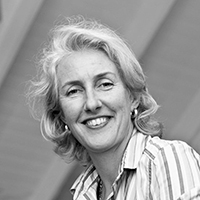Phoebe Wynn-Pope
From Humanitarian Work to Human Rights in the Commercial Sector
In Conversation with Dr Phoebe Wynn-Pope (PhD International Law 2008)
Dr Phoebe Wynn-Pope began her career as humanitarian worker, working on the ground in complex humanitarian emergencies and conflict zones. She has over 25 years of experience in this sector and has worked throughout the Middle East, Asia, Africa and Europe. Phoebe reflects that her motivation to work in the humanitarian sector came from a desire to address the extraordinary inequality and poverty experienced by vulnerable people in humanitarian crises.
Reflecting on a career comprised of both field work and desk based research into prevention of humanitarian crises and the attendant human suffering, Phoebe notes “the work that humanitarian organisations do when responding to crises on the ground is critically important (but) we also need to be thinking pre-emptively about, and investing in, long-term solutions to the structural and social causes of these crises”. The two approaches “go hand in hand”. Working on the ground during crises gives you profound insight, but this experience can and should be leveraged to inform prevention, through policy development, early intervention and investment in critical social infrastructure.
“Often the crisis that unfolds on the ground is symptomatic of long-term structural issues. The root causes (of these events) need to be addressed at the systemic level.”
“Globally, we are all vulnerable to climate change but this vulnerability manifests in vastly different ways, so our interests – political, economic, legal and human don't necessarily align or interface comfortably.”
Phoebe observes that these competing tensions need to be weighed up, and the law can help us do this.
Following her extensive work in the humanitarian sector, Phoebe completed a PhD in International Law at Melbourne Law School in 2008. Phoebe was drawn to international law as a means to ensure accountability for the atrocities she witnessed in her humanitarian work.
“After working on the ground in the Bosnia, in the Great Lakes region in the aftermath of the Rwandan genocide, and in Somalia during the famine, I was appalled by what I saw and by the crimes that had been committed and also by the lack of international response to what was going on.”
At MLS Phoebe focused on issues relating to international humanitarian law, international human rights law, international criminal courts, tribunals and human rights institutions, and issues of state sovereignty.
“I was very much drawn to international law as a means of holding states accountable for the suffering occurring in humanitarian crises around the world. There were significant developments at the time - tribunals decoupled crimes against humanity from conflict, and the emergence of the international criminal court gave so much hope as a deterrent to the most heinous of international crimes.”
For Phoebe the complexities of navigating state accountability and humanitarian responses were starkly demonstrated during her time in Serbia during the conflict there. Phoebe reflects that imposing “very blunt” sanctions in that context resulted in “milk powder (being) held up at the border and orphanages feeding babies carrot juice because they had nothing else”. She visited psychiatric hospitals where people were tied to beds because access to medication had been cut off.
“So when we're thinking about the international response to conflicts, wherever they are, we need to think about how we can respond effectively without exacerbating human suffering.”
In her current role as Head of Responsible Business and Environmental, Social and Governance (ESG) at Corrs Chambers and Westgarth, Phoebe helps businesses navigate their human rights risks, impacts and opportunities. On the interaction between the human rights and the private sector Phoebe reflects on the emerging expectations of shareholders, investors, shareholders, employees, consumers and regulators businesses consider their human rights impacts and work to mitigate them.
The pace of change is rapid, when you realise that not so long ago in the 1980s and 1990s when globalisation brought expansion into new markets and cheap labour:
“western consumers were not really asking questions about exploitation of developing countries’ resources and the working conditions of the people producing goods traded on global markets, so long as local laws weren’t broken.”
For Phoebe it’s an exciting time to be working in business and human rights:
“I think the fascinating thing at this point in time, is that when we see states being more hesitant about their human rights commitments, we see businesses stepping up. We're seeing businesses call for and support the introduction of mandatory regulation and reporting on human rights and climate change. Much of what has been voluntary for a long time and confined to the dusty corners of “corporate social responsibility” is increasingly demanded of businesses by their stakeholders and is quickly becoming mandatory as regulators respond to that demand. The Australian Modern Slavey Act is great example of that.”
On the adequacy of law in protecting the global community from the impacts of climate change Phoebe notes that:
“there is rarely a silver bullet for a global existential threats like the climate crisis”.
In Australia, the human rights impacts of climate change are in the spotlight and an increasingly significant feature of legal challenges to major projects. Similarly, Phoebe notes that her clients are grappling with their obligations to respect First Nations Peoples’ rights and the corporate responsibility to respect their right to free, prior and informed consent (FPIC).
Prepared by: Phoebe Allan
JD Student MLS
October 2022
